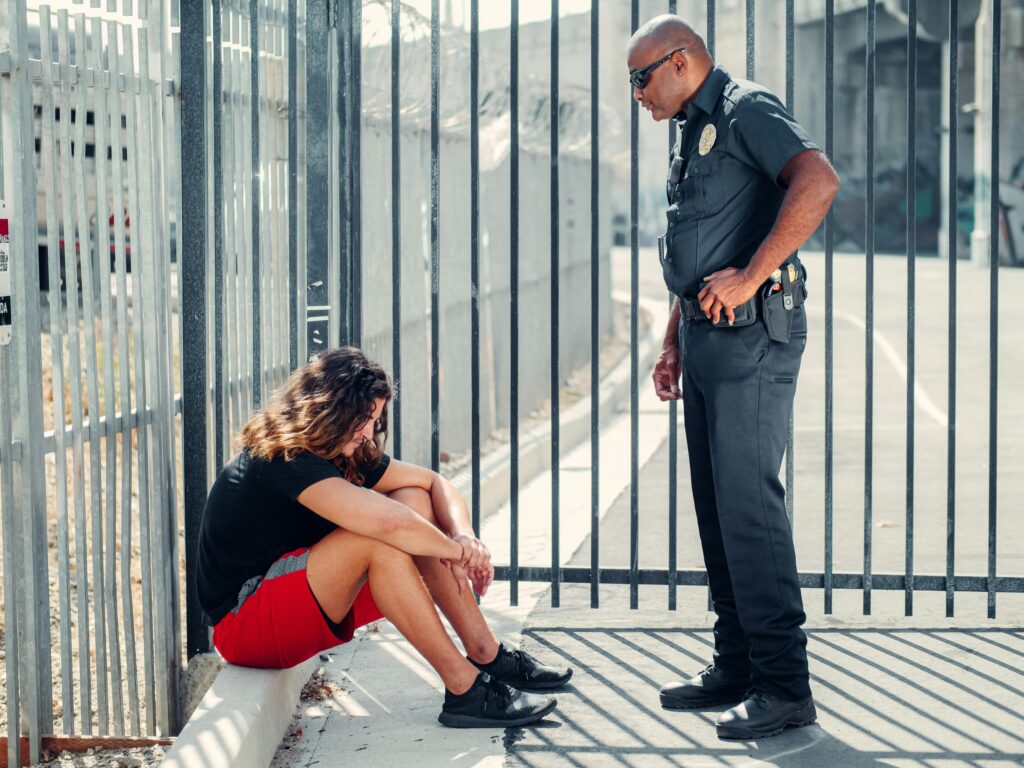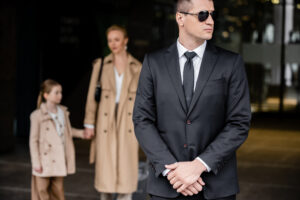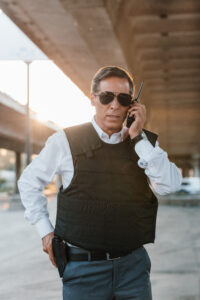Can a security guard arrest you? No. No, they cannot arrest you unless under special circumstances. The special circumstances are slim to none to likely present itself. Security guards are merely a physical deterrence of criminal activity and typically do not receive the adequate training in placing handcuffs on a person.

A security guard is a person hired to provide protection over a person or people, property, and assets. They can deter threats or acts of crime and also provide CPR and first aid services. Majority of the private security companies provide just enough training to maneuver through their shift in a safe manner. CPR and first aid training, verbal judo tactics, how to use and properly hand pepper spray, and the basic knowledge how to apply handcuffs onto a person.
Let’s dive into what verbal judo is and how it is used in the security, military, and law enforcement fields. Verbal judo is a method of persuasion and conflict resolution. It focuses on specific terms and proper wording to deescalate a situation. To paint a picture how this works; a person yelling profanity with an angry look on their face and mad about having to wait in line at the bank. The security guard’s response should include expressing their acknowledgement of the person’s anger, remaining calm, understanding the anger is not personally directed to the security guard, and actively paying attention to what the person is saying. Through these clues the security guard should be able to deescalate the angry customer by saying phrases and words that gets the person thinking differently.
The use of pepper spray or oleoresin capsicum (OC) can safely incapacitate a person that is attempting to cause harm or behaving in a threatening manner. OC is a non-lethal option for protection. It causes a burning sensation to the affected area, like the eyes. Law enforcement agencies and military personnel typically carry but many private security companies include it as well. You can also purchase OC over the counter from multiple businesses and is a preferred option for personal carry. If properly trained and administered correctly, a security guard can safely deescalate a situation to avoid having to place handcuffs on a person and wait for first responders and law enforcement to arrive to take over the scene.
A major reason private security companies want their security guards to avoid hands on scenarios because of liability reasons. Going hands on with someone increases the odds of someone getting hurt, even unintentionally. Therefore, opens the door for possible lawsuits for the private security company.

Security guards do not have arrest powers and their authority is only over protecting people, places, and objects. A citizen’s arrest is when an arrest is made by a citizen and not of a law enforcement officer. The citizen performing the arrest is only able to do so if they witness a crime and no other scenario provides the citizen with the right to arrest a person. You would think with that right, it could apply to a security guard. To a degree, it can apply to the security guard, but they must call their local law enforcement agency prior to making the arrest or detaining the person. This scenario would only occur if the crime witnessed by the security guard was a felony offense. There are also company policies and procedures the security guard should follow as well. If the private security company does not allow their security staff to detain a person, then the security guard should follow the steps and protocol accordingly.
If a security guard does attempt to detain a person, the likelihood of going hands on with the person is increased. No one likes having their hands cuffed behind them, therefore, they will do anything in their power to not allow that to happen. Those willingly abiding, likely are calm and understand or respect the current situation. The odds of having that type of person are slim. Through personal experience, you could not pay me enough money to go hands on with someone as a security guard. I say this because before my time in law enforcement, the self defense portion taught during my new hire phase was extremely bare and did not provide enough knowledge but also did not cover the tactics used to get a person to submit and go into handcuffs.
If a private security company were to invest in more self-defense courses, it would provide more confidence in security guards. Especially those with little to no experience. Increased self-defense training does not increase the likelihood of a security guard going hands on with a person. It could simply mean there’s increased odds of the security guard gaining control in a safe manner.
The good news is that there are many options of de-escalation that will help avoid a situation where a security guard must go hands on with a person. First and foremost, if they witness a crime, it is always the best option to call their local law enforcement agency and give a detailed description of the person, what happened, and where. If a person is being asked to leave the property and refusing to, verbal judo can come into play. If a person produces a non-lethal weapon, OC spray is the best response to incapacitate the person and safely remove the weapon. All these tools are readily available to the security guard. Another tool available for security guards, is a handgun. There are some private security companies that allow or require their security personnel to carry. This requires a Private Security Officer (SPO) permit to carry while on duty only. Depending on the state, a concealed carry permit may be required as well. But drawing your weapon and pointing it at a person must be reasonable and justified. A justified example is when the person also has a handgun not holstered, in their hands, and/or waving it irrationally.
Not allowing security guards arrest powers is not necessarily a bad thing. Their authority level is only over protecting people, places, or objects. There are still numerous ways they can handle the situation before the incident escalates. Verbal judo, OC, and calling local law enforcement are a few of the best tools available for a security guard to stay safe while providing adequate protection over people, places, or objects




